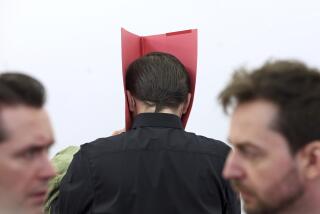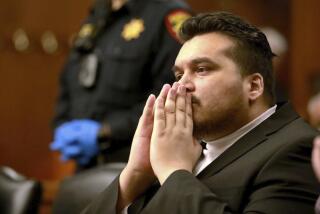Kolodziej Is Convicted of Lesser Charge : Court: A judge finds the slayer of a 90-year-old Ventura woman guilty of second-degree murder. His verdict is criticized.
- Share via
In a victory for defense attorneys, a Ventura judge ruled Wednesday that Kevin Kolodziej is guilty of second-degree murder in the stabbing death in January of 90-year-old Velasta Johnson.
Judge James M. McNally rejected a first-degree murder charge that would have carried a penalty of life in prison without parole. Instead, Kolodziej, 25, faces a possible sentence of 15 years to life.
Jackie Thetford, daughter of the dead woman, wept after the ruling was announced.
“I was hoping for first-degree murder,” she said in a barely audible voice. “I don’t care where he’s locked up. I just don’t want him out again. I’m afraid of what will happen to the next person.”
Kolodziej, who has been diagnosed as schizophrenic, undergoes another trial next week to determine whether he was insane when he entered Johnson’s Ventura home and stabbed her.
If he is found not guilty by reason of insanity, he will be hospitalized in a state institution for an indefinite period of time--possibly for life--until he is determined to be sane. McNally will hear the trial without a jury, as he did in the criminal trial.
Deputy Dist. Atty. Peter D. Kossoris had argued during the monthlong trial that the fatal stabbing was the result of a burglary gone awry, and not the act of a confused, psychotic man.
Kolodziej had been charged with both murder and burglary, and the combination of charges creates a “special circumstance” that allows prosecutors to seek a conviction for first-degree murder.
But McNally ruled that Kossoris had not proven beyond a reasonable doubt that Kolodziej intended to steal anything when he entered the Johnson residence. Therefore, he acquitted Kolodziej of burglary charges and determined that the stabbing was not a premeditated or deliberate attack.
“Obviously I would have preferred first-degree murder,” Kossoris said, although he never argued that the crime was premeditated. If Kolodziej is found sane and goes to prison, the minimum time that he could serve would be a little more than 10 years, he said.
“The good aspect is that whichever way the next phase goes he could still be held for life,” Kossoris said.
Kolodziej’s attorney, Neil B. Quinn, said his client is “disturbed in his thinking” and out of touch with reality.
“I had to explain to him that this (ruling) was good,” Quinn said. “We were pleased the special circumstance was knocked out.”
Quinn said Kolodziej is taking the drug Haldol, but that it is hard to tell whether he views himself as insane. “He understands he is different from other people,” he said.
He has expressed remorse about the killing and even has tried to mouth the words “I’m sorry” to Thetford in court. She brushed that aside.
“I’m saying he’s sorry he got caught,” she said. “I don’t feel he is insane.”
Her father, Clyde R. Johnson, 90, was not present for the ruling. But relatives said that after the verdict was announced he was disappointed and upset at the amount of money spent by the county to defend Kolodziej.
Kolodziej’s mother, Gloria Kolodziej, and his former girlfriend, Loretta Hart, said they were both pleased that he was not found guilty of first-degree murder. They think that he is insane and that the crucial portion of the case will be decided next week.
“I want Kevin in a hospital,” Gloria Kolodziej said. “He is very ill.”
Two weeks before the killing, Kolodziej had attempted suicide by stabbing himself. He was a patient in the Ventura County Medical Center when he walked away Jan. 17 and wandered through Johnson’s neighborhood.
His mother said Wednesday that she had spent three years trying in vain to get him hospitalized for his mental problems. It was unfortunate, she said, that killing someone was the only way to get care.
That was a sentiment echoed by members of the Alliance for the Mentally Ill who attended much of the trial.
“It’s much more cost-effective to take care of people than try them in court,” said Lou Matthews, a member of the group. “This was an accident, a paranoid reaction. I wouldn’t want to see him in anything but a hospital.”
More to Read
Sign up for Essential California
The most important California stories and recommendations in your inbox every morning.
You may occasionally receive promotional content from the Los Angeles Times.













